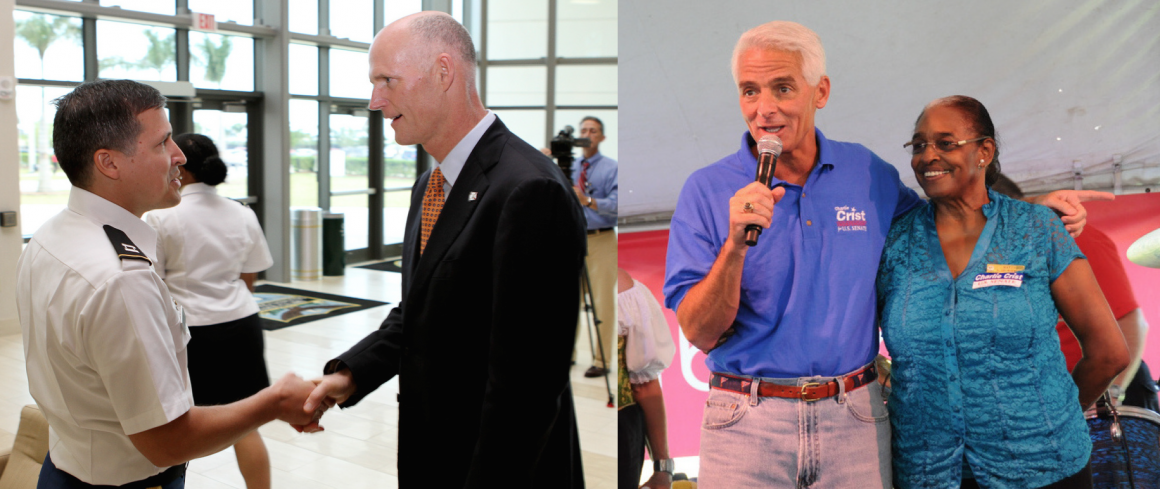We are always told that in politics, we have a choice. That we should make a choice between Candidate X who will invest in jobs, strong schools, and good infrastructure, or Candidate Y, who will harm our economy, our kids, and allow our roads to crumble. But what if we are given the choice between two inferior candidates, neither of which have presented any clear path forward? In Florida, they are stuck with a clown car race between a partisan ideologue and a pathological flip-flopper. And one of them is going to be the next governor of Florida.
Florida’s gubernatorial race between incumbent Governor Rick Scott and Republican-turned-Independent-turned-Democrat Charlie Crist is likely to become the most unpopular electoral candidates in the last 10 years. Both Rick Scott and Charlie Crist now hold net negative ratings, at -5 and -2, respectively. According to FiveThirtyEight, only twice have both gubernatorial candidates finished with net negative favorability ratings.
Even the Orlando Sentinel’s endorsement of Charlie Crist sounded highly reluctant: “There’s no getting around it: The Republican and Democratic parties in Florida have nominated two flawed candidates for governor.”
And two weeks ago, the candidates faced off in one of the most bizarre political debates ever, where Governor Scott refused to take the stage for almost five minutes due to a fan that was placed under Charlie Crist’s podium to keep him cool. The event only elevated the absurdity of this race, and left the moderators squirming to fill the awkward void on live television. You can watch the calamity in its entirety below:
But with the amount of collective campaign spending funneled into negative ads in this race, it’s no surprise this is where we are. Scott and Crist have spent more than a combined $80 million on campaign ads, almost all of them negative and void of substance.
Rick Scott has hit Charlie Crist with titles like: “Grew Up Rich,” “One Job,” “Swindled,” “Flippin’ Amazing,” and “Fiction” – while Crist has attacked Scott with gems like: “75 Times,” “Up Here,” “Stolen,” “Party,” and “Price.”
And an all-time favorite from this campaign cycle, “The Company He Keeps”.
This is a battle for whom Florida voters will dislike less. But the sad part is that this race means something – these two candidates are running for one of the most important political offices in the country. Last week, when campaigning for Crist in South Florida, Vice President Biden called the race “the single most important governor’s race in the United States of America.” And he’s probably right. For the next four years, one of these two men will govern the fourth most populous state, that educates over 2.5 million of our country’s children, and has the fourth highest GDP.
It is arguably the most important and certainly the most contested state in recent presidential elections. The next governor selects the secretary of state, who is Florida’s chief elections official. This is the state that illegally purged voters in the 2012 elections and experienced the longest voting lines in the country, discouraging at least 200,000 would-be voters who simply gave up, frustrated by having to wait so long. In a state that is no stranger to controversial elections, this selection matters.
Florida’s gubernatorial race is certainly a gold mine for pundits, journalists, and comedians alike. But elections also have consequences. And by engaging in the type of vitriol and divisiveness that we’ve seen coming out of Florida recently, the state’s future looks pretty dim. Unfortunately, whoever wins, the citizens of Florida are bound to lose.
Garrett graduated with a Masters in Public Policy from Georgetown University in 2015. He earned his BA in Political Science from the University of Chicago and worked as the Director of Undergraduate Outreach for Chicago’s Office of College Admissions after graduating. Garrett has previous experience in health policy, urban policy, and political campaigns. His interests currently focus on political strategy, national security policy, froyo, and French Bulldogs.
